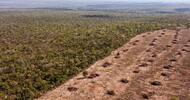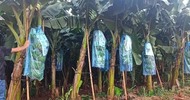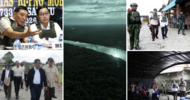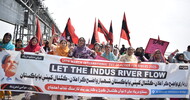A push to privatise land and other resources in countries from Ukraine to Papua New Guinea is hurting indigenous people and the rural poor, while increasing the risks linked to climate change.
TIAA is set to confirm a $21 million compensation package for its CEO and a Board of Trustees that has been unresponsive regarding the use of retirement money to grab farmland, destroy forests and violate human rights.
Dos 49,8 milhões de hectares de florestas sob responsabilidade estadual e federal, 11,6 milhões de hectares foram declarados irregularmente como imóveis rurais, de uso particular, no Sistema Nacional de Cadastro Ambiental Rural.
Aquisições de terras em larga escala — que cobrem pelo menos 200 hectares — contribuem para a destruição das florestas tropicais.
&Green Fund, with backing from the Norwegian government and Unilever, makes its first investment in a Brazilian farming company that grows soybeans and grains and raises cattle on 50,000 hectares in Mato Grosso.
Article examines the processes and actors involved and the connections that global financial capital makes in order to access lands and agricultural production in the Brazilian Cerrado.
- Globalizations
-
04 June 2020
A engrenagem do capital esmaga a Amazônia, seus povos, a floresta e seus rios: de um lado, a expansão da soja e da pecuária, unidas à derrubada e comercialização ilegal de madeiras e às queimadas criminosas que “limpam a terra” para o agronegócio
- Amigos da Terra Brasil
-
31 May 2020
BrasilAgro, which recently merged with farmland investor Agrifirma, continues to aggressively implement its business model that focuses on the acquisition and transformation of Cerrado savanna into farmland.
High Court in Lusaka rules that the conversion of village lands in Muchinda chiefdom for a large-scale agribusiness project was illegal and violated the community’s rights, but stops short of cancelling the company's title.
- Mail & Guardian
-
19 May 2020
Un nuevo informe de Rede Social de Justiça e Direitos Humanos y GRAIN, basado en una reciente investigación en terreno y documentos internos que forman parte de un caso en las cortes, reveló que la universidad utilizó múltiples compañías registradas en paraísos fiscales para acaparar más de 400 mil hectáreas en el Cerrado de Brasil.
Relatório denuncia sistema que burla a lei brasileira e permite apropriação de terras por investidores estrangeiros
- Brasil de Fato
-
12 May 2020
Greenpeace finds that 1,319 hectares of forest - equivalent to 1,800 football fields - were deforested within indigenous territories from January to April 2020.














